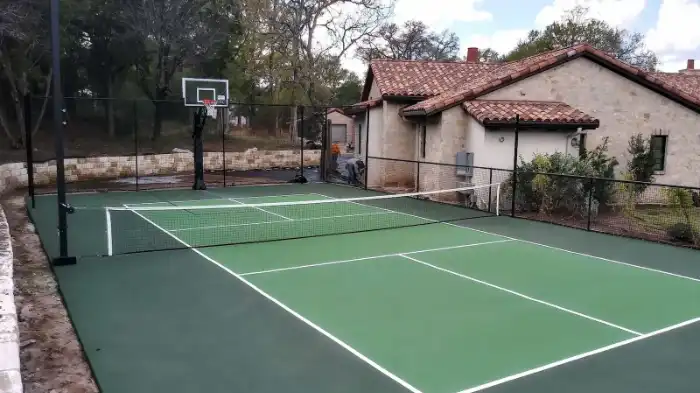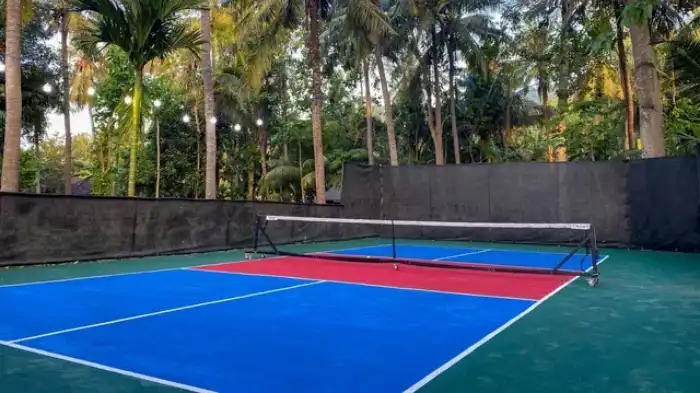If you’re passionate about pickleball and dream of having your very own at home pickleball court, you’re in the right place. In this comprehensive guide, we’ll walk you through the essential steps to create your ideal at-home pickleball court. From selecting the perfect location to gathering the necessary equipment and adding those finishing touches for an enjoyable experience, we’ve got you covered. So, let’s get started on this exciting journey to make your at home pickleball court a reality!
Steps for Building Your Own at Home Pickleball Court
1. Choose the Right Location
The first step to building your at home pickleball court is to choose the perfect location. Consider the size of the space you have available, the terrain, and any potential obstacles such as trees or slopes. Select a flat area that doesn’t have any dangerous things in the way. A flat surface is crucial for a great playing experience.
Additionally, make sure to measure the dimensions of the area to ensure that it meets the standard pickleball court size, which is 20 feet wide by 44 feet long for doubles play. If you have enough space, it’s always a great idea to leave extra room around the court for ease of movement during gameplay.
2. Gather the Necessary Equipment
Now that you have chosen the perfect location for your pickleball court, it’s time to gather the necessary equipment. Here’s a list of what you’ll need:
2.1 Surface Material: Consider using a concrete or asphalt surface for maximum durability and longevity. While there are alternative options like compacted gravel or synthetic turf, these may not provide the same level of playability and may require more maintenance in the long run.
2.2 Pickleball Net: You’ll need a regulation-sized pickleball net that is 36 inches high at the sidelines and 34 inches high in the center. Double-check that the net is firmly attached and at the right height for a fair game.

2.3 Pickleball Posts: Pickleball posts are used to hold the net in place. They should be sturdy and capable of withstanding the tension of the net. Place the posts 22 feet apart, measuring from the center of one post to the center of the other.
2.4 Pickleball Paddles and Balls: No pickleball court is complete without the paddles and balls. Make sure to invest in high-quality pickleball paddles that suit your playing style. Additionally, purchase a set of pickleballs that meet the official specifications, usually made of durable plastic material.
3. Prepare the Surface
Once you have gathered all the necessary equipment, it’s time to prepare the surface of your at-home pickleball court. Here are the key steps:
3.1 Clear the Area: Remove any rocks, debris, or vegetation from the chosen location. This will help to provide a clean surface and prevent any obstacles that could interfere with gameplay or cause injuries.
3.2 Level the Ground: Ensure that the area is level by using a shovel or a bulldozer if necessary. Smooth out any bumps or uneven surfaces to create a smooth and safe playing area.
3.3 Install the Surface Material: If you’ve opted for a concrete or asphalt surface, hire a professional to install it according to the required specifications. This ensures a high-quality playing surface that will stand the test of time.
4. Add the Finishing Touches
Now that your at-home pickleball court is complete, it’s time to add a few finishing touches to enhance your playing experience:
4.1 Lighting: If you plan on playing pickleball in the evening or during darker times of the year, consider adding lighting fixtures around the court. This will allow you to enjoy the game at any time of the day.

4.2 Seating Area: Set up a comfortable seating area near the court to take breaks and watch the action. Benches or outdoor chairs are great additions to create a relaxing atmosphere for players and spectators.
4.3 Storage for Equipment: Lastly, consider adding a storage space to keep your pickleball equipment organized and protected. This can include a small shed or a designated area for storing paddles, balls, and other accessories.
Frequently Asked Questions
While concrete or asphalt is recommended for the best playing experience, you can use compacted gravel or synthetic turf. Just keep in mind that these options may require more maintenance and might not offer the same level of playability.
Consider adding lighting fixtures around the court for nighttime play, allowing you to enjoy your at-home pickleball court at any time of day.
Regular maintenance is essential to keep your court in top condition. This includes cleaning the surface, inspecting and tightening the net and posts, and ensuring proper drainage to prevent water buildup. Additionally, you might need to reseal or resurface the court surface every few years, depending on the material used.
The timeline for construction depends on various factors, including the complexity of the project and weather conditions. Generally, it can take several weeks to a few months to complete the entire process, from site preparation to finishing touches.
Conclusion
In conclusion, creating your own at-home pickleball court is an exciting project that can transform your backyard into a hub of active fun and entertainment. Whether you’re a seasoned player or a beginner, having your very own at home pickleball court allows you to enjoy the game to the fullest, spend quality time with friends and family, and even practice your skills at any time.
Remember, selecting the right location, gathering the necessary equipment, and preparing the surface are vital steps in this process. By adding those finishing touches like lighting, seating, and equipment storage, you can truly make your at home pickleball court a neighborhood favorite.

